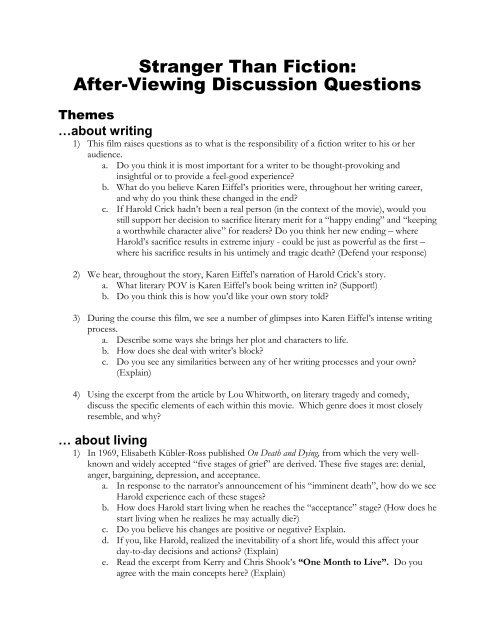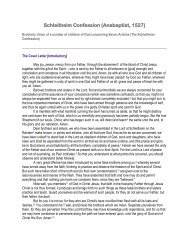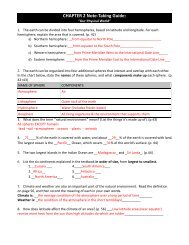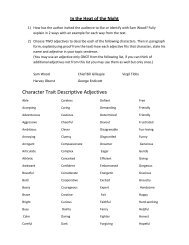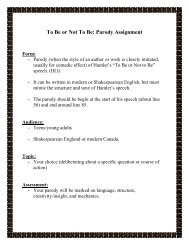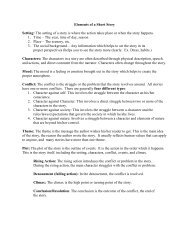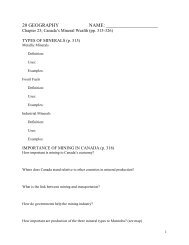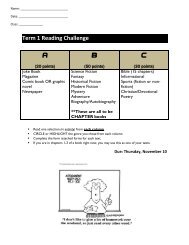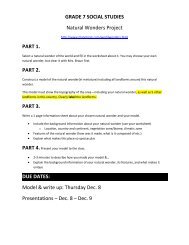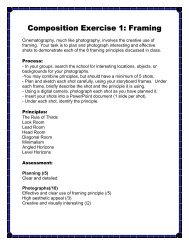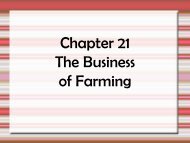Stranger Than Fiction: After-Viewing Discussion Questions - schs
Stranger Than Fiction: After-Viewing Discussion Questions - schs
Stranger Than Fiction: After-Viewing Discussion Questions - schs
You also want an ePaper? Increase the reach of your titles
YUMPU automatically turns print PDFs into web optimized ePapers that Google loves.
<strong>Stranger</strong> <strong>Than</strong> <strong>Fiction</strong>:<br />
<strong>After</strong>-<strong>Viewing</strong> <strong>Discussion</strong> <strong>Questions</strong><br />
Themes<br />
…about writing<br />
1) This film raises questions as to what is the responsibility of a fiction writer to his or her<br />
audience.<br />
a. Do you think it is most important for a writer to be thought-provoking and<br />
insightful or to provide a feel-good experience?<br />
b. What do you believe Karen Eiffel’s priorities were, throughout her writing career,<br />
and why do you think these changed in the end?<br />
c. If Harold Crick hadn’t been a real person (in the context of the movie), would you<br />
still support her decision to sacrifice literary merit for a “happy ending” and “keeping<br />
a worthwhile character alive” for readers? Do you think her new ending – where<br />
Harold’s sacrifice results in extreme injury - could be just as powerful as the first –<br />
where his sacrifice results in his untimely and tragic death? (Defend your response)<br />
2) We hear, throughout the story, Karen Eiffel’s narration of Harold Crick’s story.<br />
a. What literary POV is Karen Eiffel’s book being written in? (Support!)<br />
b. Do you think this is how you’d like your own story told?<br />
3) During the course this film, we see a number of glimpses into Karen Eiffel’s intense writing<br />
process.<br />
a. Describe some ways she brings her plot and characters to life.<br />
b. How does she deal with writer’s block?<br />
c. Do you see any similarities between any of her writing processes and your own?<br />
(Explain)<br />
4) Using the excerpt from the article by Lou Whitworth, on literary tragedy and comedy,<br />
discuss the specific elements of each within this movie. Which genre does it most closely<br />
resemble, and why?<br />
… about living<br />
1) In 1969, Elisabeth Kübler-Ross published On Death and Dying, from which the very wellknown<br />
and widely accepted “five stages of grief” are derived. These five stages are: denial,<br />
anger, bargaining, depression, and acceptance.<br />
a. In response to the narrator’s announcement of his “imminent death”, how do we see<br />
Harold experience each of these stages?<br />
b. How does Harold start living when he reaches the “acceptance” stage? (How does he<br />
start living when he realizes he may actually die?)<br />
c. Do you believe his changes are positive or negative? Explain.<br />
d. If you, like Harold, realized the inevitability of a short life, would this affect your<br />
day-to-day decisions and actions? (Explain)<br />
e. Read the excerpt from Kerry and Chris Shook’s “One Month to Live”. Do you<br />
agree with the main concepts here? (Explain)
2) John 15:13 reads, “Greater love has no one than this, that one lay down his life for his<br />
friends.” (NASB).<br />
a. Explain this statement in the context of the choices we see Harold make, specifically<br />
after reading his story and the ending as (author) had written it. Then, explain what this<br />
shows us about his character.<br />
b. Karen Eiffel and Penny Escher also, to a smaller degree, sacrifice themselves for the<br />
good of another. (Explain)<br />
c. Harold’s sacrifice prompts Eiffel to sacrifice in turn, which prompts Escher to sacrifice.<br />
What does this pattern suggest about the nature of sacrifice? Do you believe that this<br />
principle (as you’ve identified) is true to life?<br />
3) Harold doesn’t see why his suffering is necessary until he has the opportunity to read the<br />
entire piece Eiffel has written about him. <strong>After</strong> seeing “the big picture”, even though<br />
nothing has changed and his personal outcome is the same, he tells Eiffel she should keep<br />
the ending.<br />
a. Why do you think Harold decides she should keep her ending as-is? (why doesn’t he ask<br />
her to find a way to change it?)<br />
b. How can realizing there’s a “bigger picture” help us deal with our own struggles?<br />
4) Karen Eiffel says, near the end of the film:<br />
As Harold took a bite of Bavarian sugar cookie, he finally felt as if everything was<br />
going to be ok. Sometimes, when we lose ourselves in fear and despair, in routine and<br />
constancy, in hopelessness and tragedy, we can thank God for Bavarian sugar cookies.<br />
And, fortunately, when there aren't any cookies, we can still find reassurance in a<br />
familiar hand on our skin, or a kind and loving gesture, or subtle encouragement, or a<br />
loving embrace, or an offer of comfort, not to mention hospital gurneys and nose<br />
plugs, an uneaten Danish, soft-spoken secrets, and Fender Stratocasters, and maybe<br />
the occasional piece of fiction. And we must remember that all these things, the<br />
nuances, the anomalies, the subtleties, which we assume only accessorize our days, are<br />
effective for a much larger and nobler cause. They are here to save our lives. I know<br />
the idea seems strange, but I also know that it just so happens to be true.<br />
a. Summarize what Eiffel is saying, in your own words.<br />
b. Do you agree with her ideas, as you understand them?<br />
5) Ana Pascal tells Harold, “...I figured if I was gonna make the world a better place... I would<br />
do it with cookies...”<br />
a. What does she mean?<br />
b. Do you agree with her mentality? Can you “make the world a better place” with cookies?<br />
c. If you were going to choose to make the world a better place, how would you do it?<br />
The Art of the Film<br />
1) This film includes an unusually high number of “over-the-shoulder” shots. What effect do<br />
you think this technique was intended to have?<br />
2) Music and sound was used very intentionally. What effect can music have on a viewer’s<br />
mood/understanding of the film?<br />
3) There were a number of motifs used throughout this film. Describe the possible role<br />
(symbolic or otherwise) of: Taxes/numbers, The wrist-watch, and Cookies/baking


